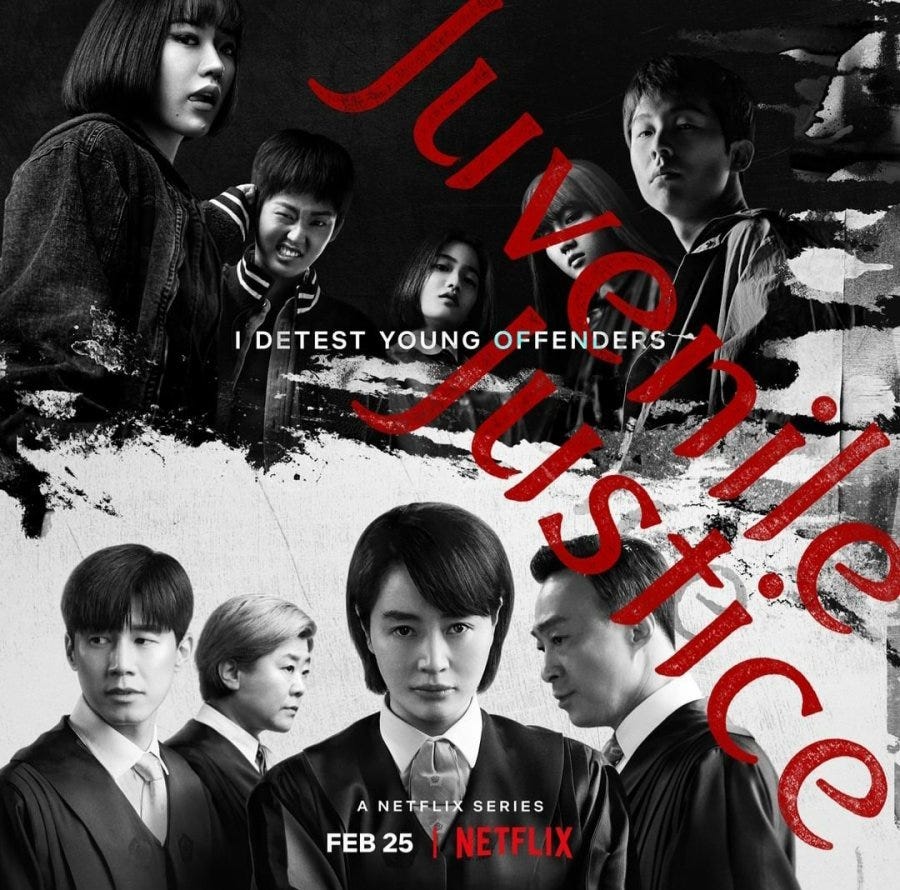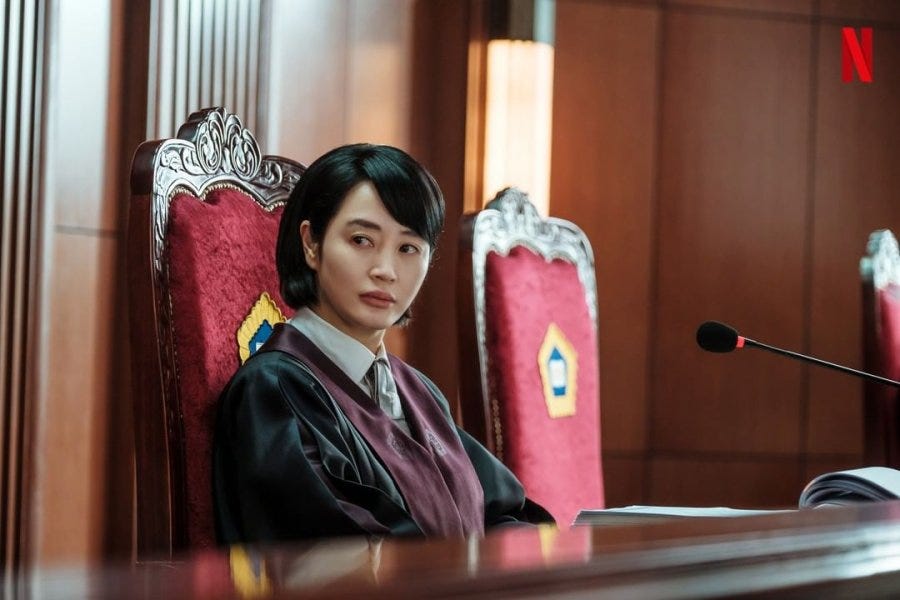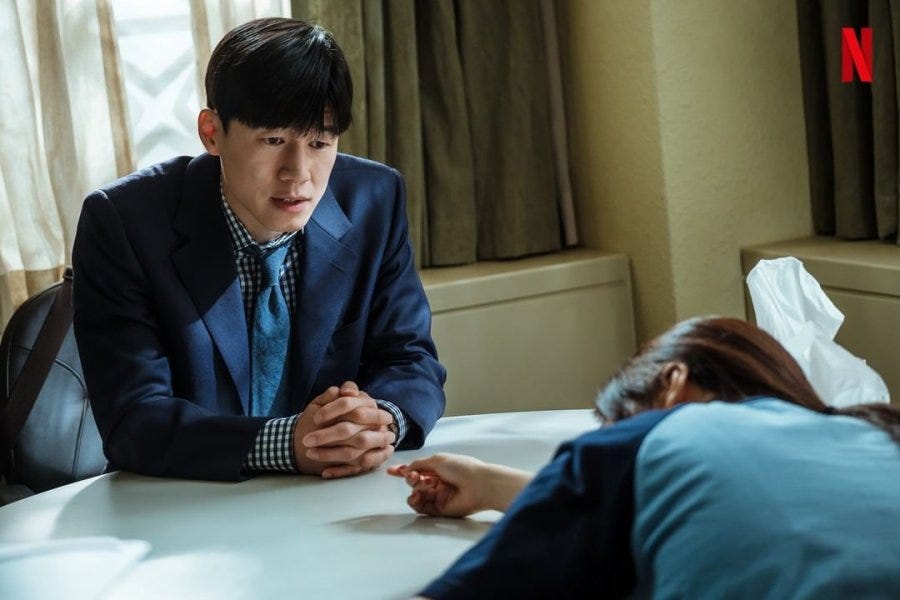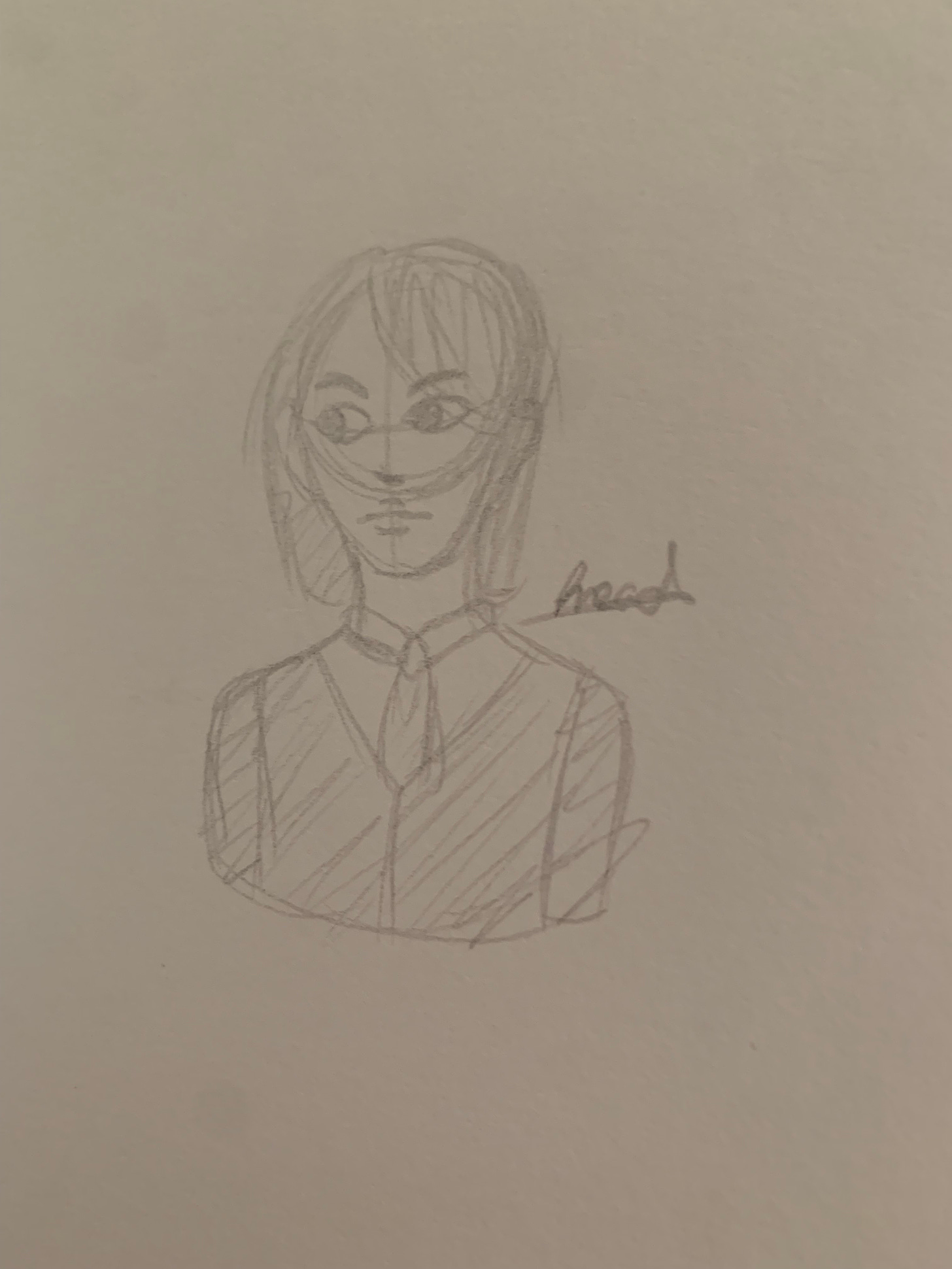Juvenile Justice (2022)
Sim Eun-seok or Judge Sim (Kim Hye-soo) as she’s known by her colleagues and the young culprits under her charge is a curious figure. She takes up her post in the highly specialized juvenile court on the one hand and yet is not backwards in coming forwards about the fact that she “detests juvenile offenders”. A statement like that of course not only sounds like a declaration of war but it also hints at a tragic backstory lurking in the background waiting to be uncovered at a later time. The enigma is given more substance when the apartment that she goes back to on the rare occasion, remains unlived for much of what transpires in these 10 episodes when she’s not in the office poring through sheafs of legal documents. It is more or less standard practice in South Korean dramas for the main character to be at the centre of the storytelling even when the viewer experiences a suspicious feeling that some invisible ethical line has been crossed in the meantime. Nonetheless by the end of the drama, the statement that she detests juvenile offenders rings rather differently than first impressions might indicate.
From the moment Sim Eun-seok steps into the office, her brusque manner makes quite the impression. Not only does her normally softly spoken junior colleague Judge Cha Tae-joo (Kim Mu-yeol) sit up and take notice but the two are immediately set up as polar opposites —Yin and Yang — ripe fodder for some lively philosophical clashes along the way. Nature vs nurture. Individual vs society. The family as a civilizing force. Part of the problem seems to be that Eun-seok is loathed to explain herself because she thinks she has nothing to prove. She may also have a hidden agenda. The other part has to do with Tae-joo’s own tale of redemption that colours his views on the young offenders. He is the True Believer of second chances for good reason. He is the poster boy success story of the criminal justice system. She, on the other hand, is far less idealistic. Nevertheless, it’s hard to know what she believes because what comes out of her mouth doesn’t always align with her deeds. The moody judge also has a penchant for being annoyingly taciturn. Her cynicism and lack of trust comes across to those who don’t know better, as hostility and indifference.
Clearly those behind Juvenile Justice doesn’t believe that a dispassionate presentation of this very complex issue will hook and reel in an audience accustomed to a steady diet of melodrama. The drama trades heavily on highly dramatic moments in and out of the courtroom and it’s odd to see sitting judges running around doing the work of cops and prosecutors. It does make for exciting television but throws up questions related to occupational codes of conduct that are being transgressed. Moreover, Sim Eun-seok is not really much of a team player and is driven to solve every case by her own hand. At times the temptation is for the show to become a one-woman enterprise, sleuthing and handing down verdicts from her lofty place on the bench.
Of course the audience isn’t directed to hold this against her because we are intimately positioned to see that world through her eyes. It goes some way to explaining her ubiquity in the narrative. It scarcely goes without saying that Korean dramas take the notion of lead characters rather seriously sometimes to the exclusion of all else. This clues us to the fact that the drama is less concerned about the day to day workings of the justice system and more about pressing social issues that have ramifications not just for the legal experts but for every single man, woman and child in the country. Juvenile crime is less a criminal issue and more a socio-cultural affair with ripple effects everywhere. It’s not clear that the show points the finger at family dysfunction as the sole culprit but it might be the single most decisive factor in all of this. Domestic violence for instance, is at the top of the list probably followed by negligent parents who use their resources to rationalize their children’s and their own sins. However, there are also problems within. Needless to say there are deficiencies within the criminal justice system that undermine the message and the function of the judiciary like judges with agendas that diminish their integrity. Conflicts of interests are the slippery slope to political corruption, guaranteeing compromised judgments to come.
Hence, Juvenile Justice can hardly be accused of being easy watch (and it works along the same vein as D.P.) It’s purpose is to raid wardrobes squeaking under the weight of skeletons and challenge thinking on a notoriously seemingly insoluble issue. The final arc that features a blast from Eun-seok’s past is horrifying in its brutal frankness about young unrepentant souls. Second chances tragically don’t always work. Not everyone wants to or can change. It’s a bleak reality of the human condition. Not everyone acknowledges the generosity of society’s desire to rehabilitate or reform wayward youngsters. There will be disappointments and failures to mourn over despite all the best intentions in the world.
In truth I don’t like or dislike Sim Eun-seok. She’s too much of a cipher to be relatable and often her behaviour borders on zealotry. She might play at being a judge but what she really is is a crusading pedagogue and a mother. The world she inhabits is her classroom that’s why her apartment looks perpetually uninhabited. She has no home but an after-hours respite away from the office. In court she schools her young charges about the meaning of life while lecturing caregivers on their irresponsible oversight which sees her and her colleagues cleaning up after them. Out of court, she’s a watchdog keeping the people in the office on their toes and on the straight and narrow. The show’s sympathies are largely with her undoubtedly because she has victim status. Her perspective is privileged because she has first hand experience being on the other side of the bench. While it is the showrunners’ prerogative to do so, this decision leads to the weakening of Cha Tae-joo’s role in the narrative. His resulting subservience though understandable doesn’t come across as attractive. The two it seems to me are always better working as a team but oddly enough, that collaborative spirit has little appeal to the producers who exploit the clashing opposites trope for as long as they can. Furthermore, her strengths seem to come at the cost of overplaying his kindly inclinations. Sure, he is her junior and has a lot to learn from his seniors but he is a decent human being whose decency is often perceived to be a flaw rather than an asset. As far as I know, he’s managed to pass the judiciary eligibility exam somehow and from what I remember in Law School, that’s not a professional pathway for the weak-minded.
Juvenile Justice while about crimes, is not a detective show although there are what might be considered procedural elements to it as if to appeal to those of us who crave a bit of mystery . All that is to camouflage the fact that it is a relentless moral tirade about the lack of social cohesion leading to more and more outrageous crimes committed by those who can’t legally vote or get behind the wheel of a car. I imagine that much of this is based on actual events because the rise in teenage of crime isn’t purely a South Korean phenomenon. A few years ago, I’d seen headlines in one of our national newspapers claiming that there was a noticeable increase in violent crimes among the youth in our city. There was plenty of outcry then. This drama certainly gets deep into the weeds of the issues no holds barred with some offer of solutions making a desperate appeal to families, politicians and the criminal justice system to get their house in order.
(Rating: 8.8/10)





